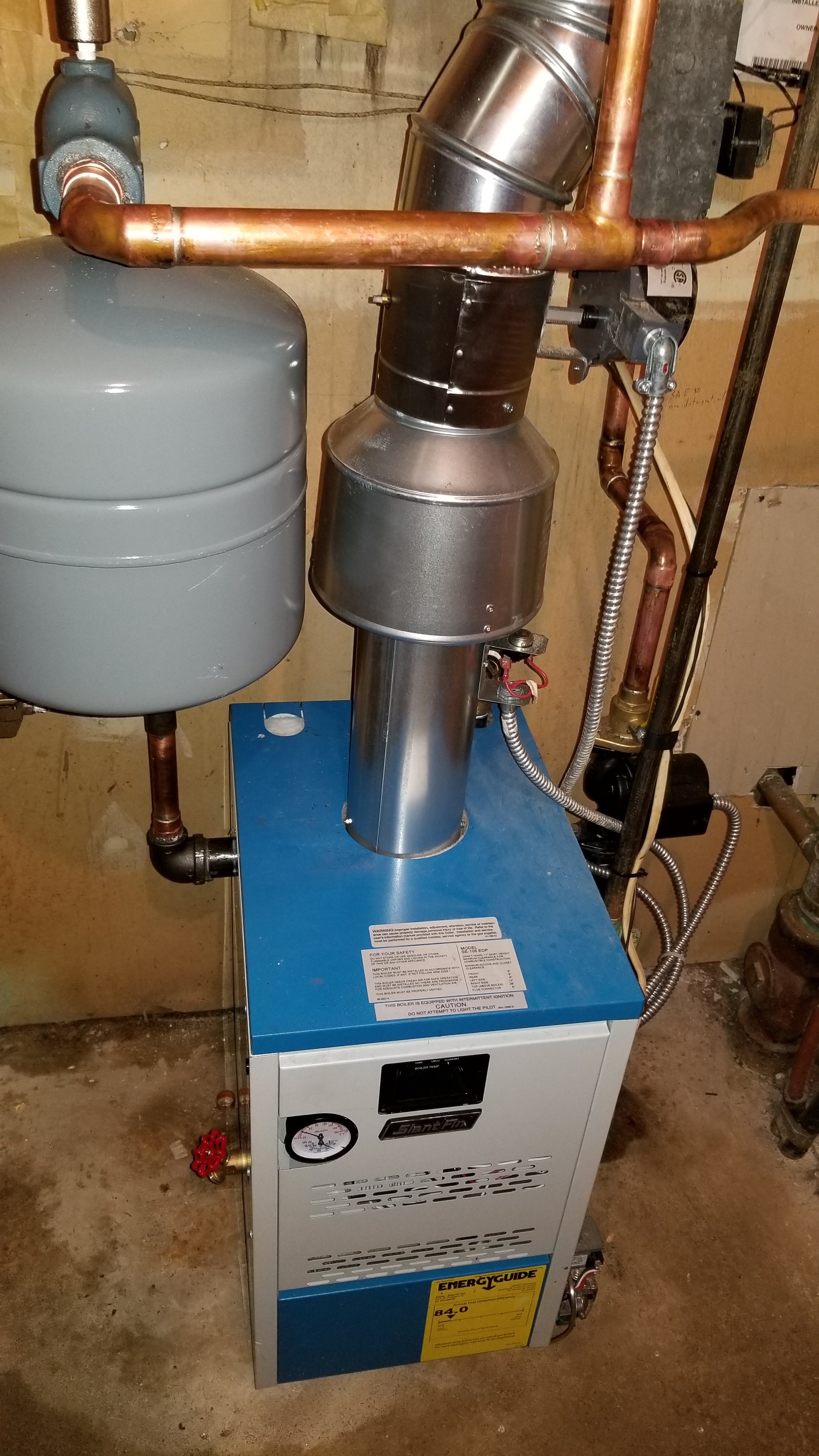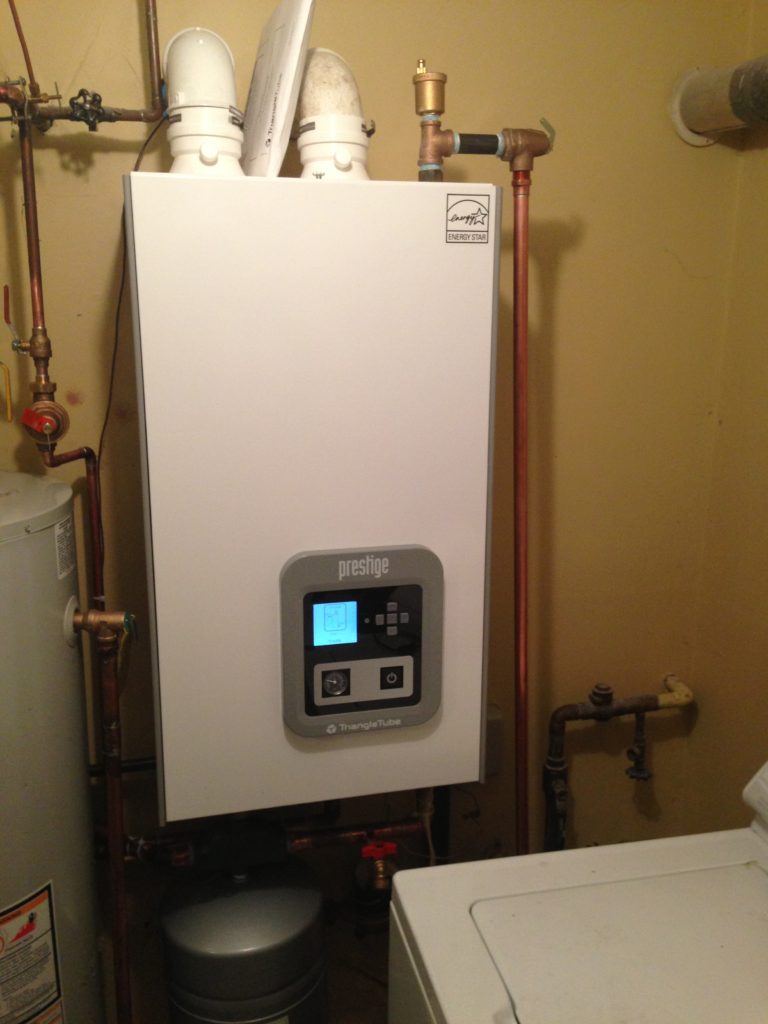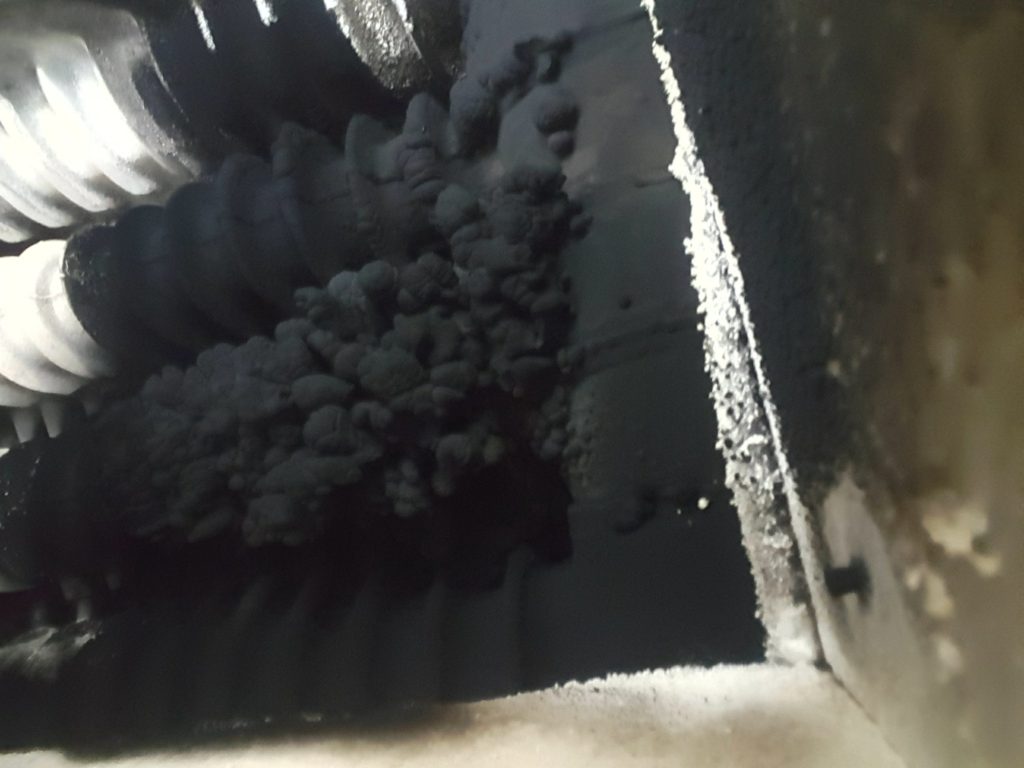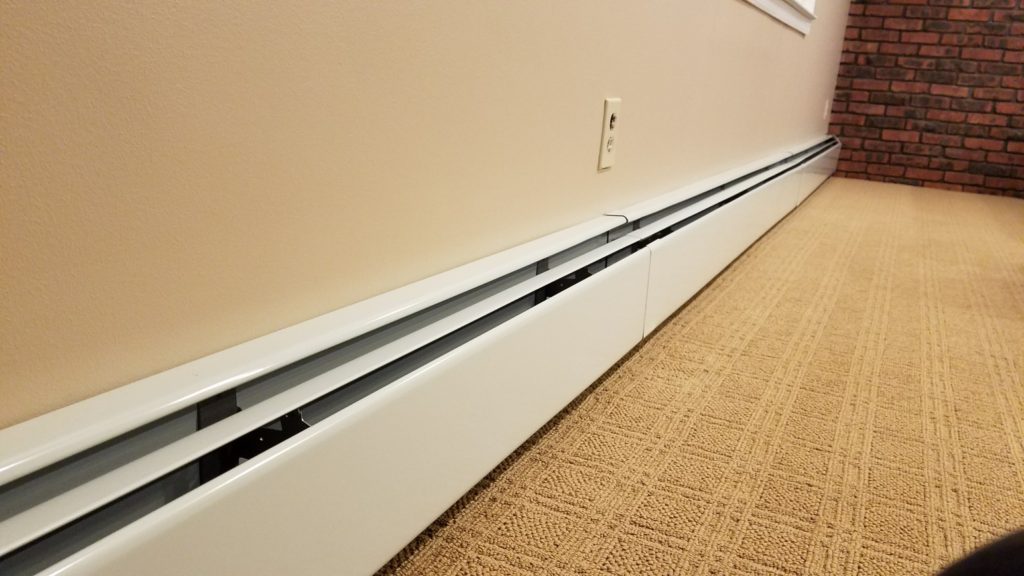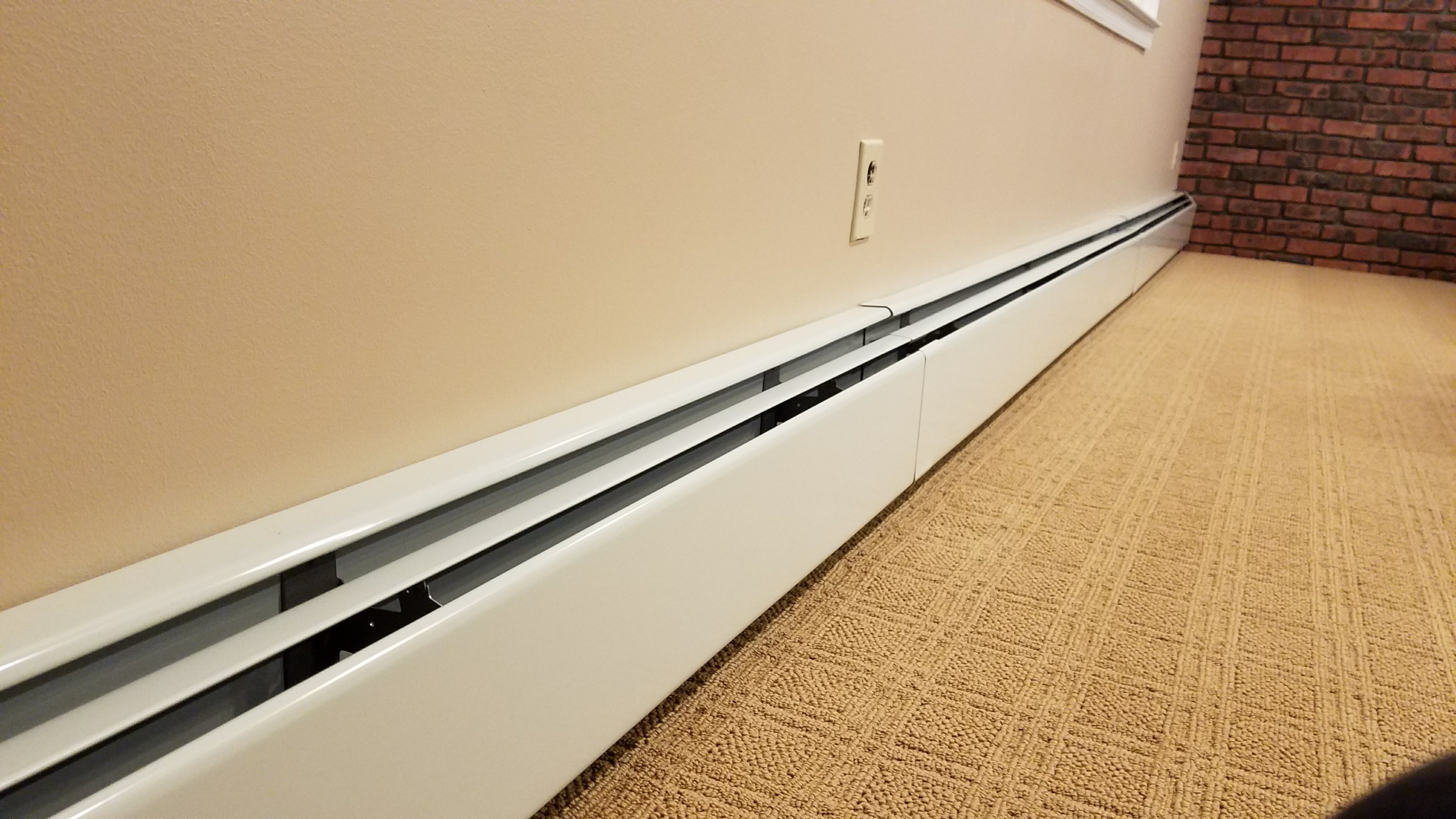Blog
September 16, 2017 in Homeowner Tips, Our Work, Questions & Answers
Truth abough high efficiency tankless boilers
There are many good things to say about high efficiency/ tankless hot water heating boilers. You’ve heard many good things like the savings and the energy efficiency. These things are smart. Some units even come with an outdoor sensor that will adjust their output according to the temperature outside. So if it’s 20 out it will urn at 100%, but if it’s 60’s out it may modulate down to 30%. Smart! Modulation is another great feature. Ability to cycle down or up percentage of burning power. Like adjusting a burner on a range top. Standard counterparts only have 2 speeds and they are 100% or off.
Majority of high efficiency boilers are condensing. Which means that they are able to utilize/absorb more heat from combustion than their standard counterparts. Flue/combustion gasses leaving these boilers are much less hot than that of standard counterparts (650°F vs 80°F). Since these gasses transfer/lose/utilize so much heat @ combustion, condensation occurs.
Now lets delve into potential weaknesses. First and most obvious, these systems are much more complex than their standard counterparts and have a lot more parts functioning. Statistically speaking the more parts the more chances there are for malfunction of one of these parts. What should also be considered is our water. We have very hard water. It mineralizes everything, especially boiler insides. This buildup sometimes hinders the function of all of these sensors and malfunction may occur. Manufacturers recommend a chemical wash every year. This process removes all mineral buildup and cleans the insides of the boiler, however this is a time consuming task that is also significantly more expensive than a standard boiler maintenance. On a side note a water softener significantly reduces this buildup accumulation. Condensation can be an issue if exhaust is not properly installed. Shall other general malfunction to occur not all techs are able to diagnose the issue. Parts are typically very brand and model specific, which leads parts (un)availability.
High efficiency boilers are the pinnacle of HVAC technology. However, for a homeowner it is a costly investment, which also requires annual upkeep.
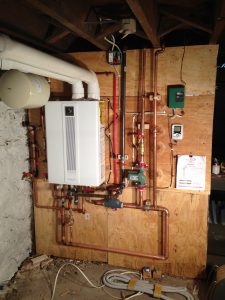
high efficiency Quietside combi boiler installation
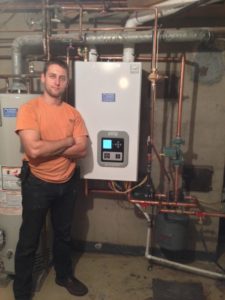
Triangle Prestige High efficiency boiler
September 12, 2017 in Homeowner Tips, Questions & Answers
Heating Maintenance Part II, Combustion
In the last post we talked about the importance of changing of water in a hydronic (water) heating system. This post I’d like to discuss the importance of maintenance of the heating part of the system. In order for your boiler or furnace to operate for years to come it must operate with clean combustion (low smoke, low carbon monoxide output). Smoke creates soot, which eventually blocks the heat-exchanger in a boiler. This results in an unsafe and potentially deadly environment and can lead to the condemnation of the heating system. Combustion can be regulated and calibrated for optimal output to make sure this doesn’t happen.
Hot air furnaces have heat-exchangers that are long tubes of thin steel. Combustion that heats your air occurs in that heat-exchanger and must be vented outside. Sometime a heat exchanger will crack and combustion gasses can be mixed with breathing air and can result in unsafe environment. That situation may also warrant condemnation of the heating system.
The last thing anyone wants is a mid winter night heating system condemnation with out warning, nor carbon monoxide poisoning. These things should be inspected annually and corrected before it’s too late. Other maintenance should include cleaning flame sensors and checking all other sensors for operation as well as running a full system check for starting and ending system operation. Dust and lint should be wiped off the system to prevent accidental fire and any parts require special attention should be corrected as required. Although many of us take heating and comfort of our home for granted, we must be aware that it can fail and sometimes signs are there if you know how to look for them. Please call to schedule your heating system service soon.
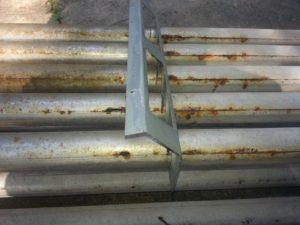
Cracked heat exchanger on a hot air furnace.
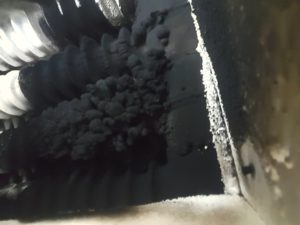
Blocked heat-exchanger on a boiler
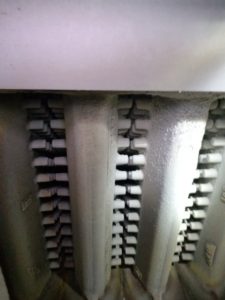
Clean heat exchanger on a Boiler
September 10, 2017 in Homeowner Tips, Questions & Answers
Heating Maintenance Part I, Boilers
In this post Id like to address the importance of heating pre-season maintenance. More specifically the water heating boilers. You depend on your heating system all fall, winter, and part of spring to perform without a hitch year in and year out and to do so things must be looked over and serviced if and when necessary. That’s why a professional checkup is essential to keep things running smoothly for years to come
All boilers use a closed loop system, which means that the water that is used for heating is completely separate from the water you utilize in the rest of your home. Our local wter is very hard and that water is cooked/heated hundreds if not thousands of times throughout each season so you can imagine what that water may look like. When this water is heated it goes through a chemical change, where oxidation, miniralization, mud, crud and everything in between happens. That water should be removed and and whole system should be washed through. That is especially important when a tankless high efficiency system is installed. The new high end tankless systems have tiny tanks that have a bunch of sensors that get overminiralised fairly fast and must be chemically washed/purged to avoid serious problems that may result in system failure. This is just one aspect of annual maintenance. We will cover other aspects of maintenance in following posts. Keep tuned and thanks for reading.

